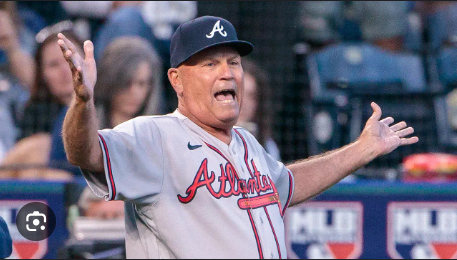
In a significant roster development, the Atlanta Braves are preparing to replace 35-year-old veteran pitcher Chris Sale, who has been a critical part of the team’s pitching rotation. Though Sale’s departure from the active roster comes as a surprise, the Braves front office has laid out a strategic roadmap to mitigate his absence, ensuring that the team’s momentum remains unshaken.
Injury or Performance Decline? The decision to replace Sale stems from a blend of factors. While Sale has been a high-caliber pitcher throughout his career, his recent outings have raised concerns over both his durability and performance. Speculation suggests that lingering injuries might have affected his mechanics, leading to an inconsistent season. Despite his reputation as a workhorse with a career filled with strikeouts and elite fastballs, age and wear have started to take their toll.
According to team insiders, Sale has been dealing with ongoing shoulder discomfort, which may have led to his decreased velocity and inability to sustain long outings. The Braves’ medical staff had been closely monitoring him, but after several meetings between Sale, the front office, and the coaching staff, the decision was made to sideline him for an extended period to allow for recovery or perhaps a longer-term reevaluation.
Strategic Adjustments: Braves’ Next Steps
The Braves have been quick to outline their strategy to fill the void left by Sale, ensuring that the team’s performance remains competitive in their pursuit of a World Series title. Several key tactics are in play:
- Promoting Youth Talent The Braves’ farm system has been one of the best in Major League Baseball over the past few years, and the organization is known for developing top-tier young talent. Insiders indicate that the Braves are looking at their highly regarded minor-league prospects to step into the rotation. Pitchers like AJ Smith-Shawver or Hurston Waldrep are being considered for a call-up. Both have showcased exceptional promise and could provide the youthful energy and arm strength needed to compensate for Sale’s absence.
- Shifting to a Bullpen-Heavy Strategy One key adjustment under consideration is a bullpen-heavy approach. This tactic would involve utilizing a series of relievers to cover the innings that a starter like Sale would normally handle. The Braves have a deep bullpen, with closer Raisel Iglesias and setup men like A.J. Minter and Pierce Johnson ready to step into increased roles. This strategy would allow the Braves to manage workloads carefully while maintaining high-level pitching, especially during critical stretches of the season.
- Exploring Free Agency or Trade Market Although the Braves are in the midst of the season, rumors suggest that General Manager Alex Anthopoulos could explore the free-agent or trade market for a veteran pitcher. With several teams already out of playoff contention, the Braves could potentially find a stopgap pitcher who could provide solid innings during the postseason run. Insiders report that the Braves are monitoring pitchers who are both experienced and available, including possible options from non-contending teams.
- Relying on Veteran Leadership While Sale’s absence is significant, the Braves are fortunate to have other veteran pitchers on the roster who can take on more responsibility. Max Fried, Spencer Strider, and Charlie Morton will be expected to anchor the rotation. Strider, who has been dominant this season, is seen as a cornerstone in this transition period, while Morton’s extensive playoff experience provides a calming presence for the younger pitchers.
Impact on Postseason Aspirations
The Braves are in the midst of another strong campaign, and their postseason ambitions remain high despite the setback with Sale. Sale, brought in as a veteran presence, was expected to bolster the rotation down the stretch. However, his potential absence during critical postseason matchups could change the team’s approach.
Sale’s leadership and postseason experience were crucial factors when the Braves acquired him. His ability to handle the pressure of October baseball was expected to be a game-changer, but now the Braves must rely on their depth and adaptability. The front office is confident that the team’s current roster, combined with strategic tweaks, will allow them to remain competitive even without one of their most experienced arms.
Long-Term Implications
While Sale’s short-term future with the Braves is uncertain, it raises questions about his long-term role within the organization. With the growing reliance on younger, fresher arms, the Braves may consider transitioning Sale into a different role—perhaps in the bullpen or as a mentor to younger pitchers once he returns. Alternatively, depending on his recovery, this could mark the twilight of his career with the Braves.
As the Braves continue their postseason push, their ability to adapt to this significant roster shakeup will be a test of their resilience and management’s foresight. One thing remains clear: the Braves, with or without Chris Sale, are focused on the ultimate prize—a World Series championship.

Leave a Reply